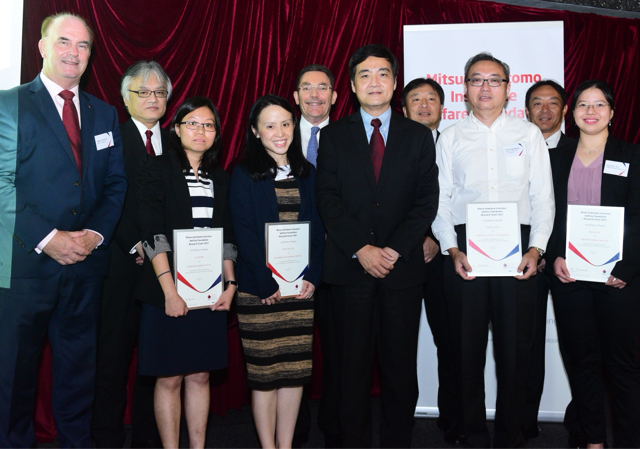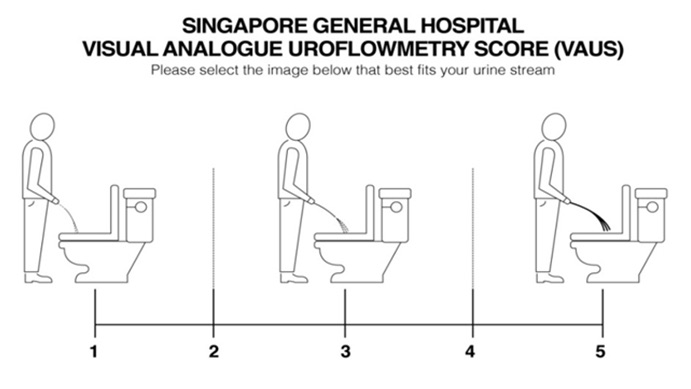Innovative research on seniors’ welfare
The Mitsui Sumitomo Insurance Welfare Foundation this year awarded three grants to projects related to improving senior’s welfare, including a fall detection monitoring system.
BY: Eleanor Yap

The grant recipients include Lim Zhiying (third from left), Prof Tan Kok Kiong (second from right) and Dr Neo Shu Hui (first from right).
Seniors can continue living independently in their communities and caregivers can get extra piece of mind knowing that if their loved ones fall, there is a fall detection monitoring system that sends a message to the caregivers. This idea developed by Professor Tan Kok Kiong from the Department of Electrical and Computer Engineering at the National University of Singapore’s Faculty of Engineering is one of three projects on improving the welfare of seniors that received the Mitsui Sumitomo Insurance Welfare Foundation (MSIWF) research grant this year.
The proposed non-intrusive, location-based monitoring system utilises an accelerometer and sound-based detection to detect when the user falls. The device also acts as a low-cost hearing aid for seniors with hearing problems. The system can be in the form of a watch, a pendant or a clip on the belt. Shared Prof Tan, “Current solutions in the market face low take-up rate and a high number of false alarms. Our main objective is to help seniors who stay alone in studio apartments. However, the system is also well-suited for use in elderly day care centres and general households.”
He added that the system will be tested on a group of seniors and after which, he is aiming to release into the market in early to mid-2019. Prof Tan received S$9,948 from the grant.
To improving seniors’ quality of life, other grant recipients include Lim Zhiying, senior medical social worker at Singapore General Hospital (SGH), who is doing a research study on the experience of elderly patients with multiple chronic illnesses and differing functional status in adhering to their treatment regimes. Explained Lim: “As previous studies have shown, patients who require the consumption of multiple daily medications were more likely to have a poorer adherence level. Findings from one particular study has also suggested that the elderly’s desire for independence has a strong influence on how they view their illnesses and adhered to their treatment regimens.”
She added that there were many reasons for this poor adherence. On the healthcare provider side, there may be issues of continuity of care provided to patients and the open communication between patient and doctor. On the patients’ side, it could be due to the complexity of the treatment regimens, level of patients’ impairment and their social support.
It is hoped that the findings, which will be completed in January 2019, will lead to the implementation of relevant and targeted interventions to better support this group of seniors in managing their multiple chronic illnesses. Lim received a grant of S$9,000 from MSIWF.
 Another grant recipient is Dr Neo Shu Hui, resident physician at SGH, who is looking at the effectiveness of incorporating visual analogue uroflowmetry score (VAUS) in primary care physicians’ evaluation process of elderly men with lower urinary tract symptoms. Shared Dr Neo: “In Singapore, primary care physicians follow their non-standardised investigative protocols such as taking the patient’s history and physical examination, and decide whether the patient requires a referral for specialist care. Lower urinary tract symptoms are prevalent in the elderly and can impact their quality of life significantly. VAUS is a cost-efficient, easily administered, non-invasive tool to help family physicians monitor disease progression of patients with lower urinary tract symptoms, that can potentially reduce unnecessary referrals to a specialist service.”
Another grant recipient is Dr Neo Shu Hui, resident physician at SGH, who is looking at the effectiveness of incorporating visual analogue uroflowmetry score (VAUS) in primary care physicians’ evaluation process of elderly men with lower urinary tract symptoms. Shared Dr Neo: “In Singapore, primary care physicians follow their non-standardised investigative protocols such as taking the patient’s history and physical examination, and decide whether the patient requires a referral for specialist care. Lower urinary tract symptoms are prevalent in the elderly and can impact their quality of life significantly. VAUS is a cost-efficient, easily administered, non-invasive tool to help family physicians monitor disease progression of patients with lower urinary tract symptoms, that can potentially reduce unnecessary referrals to a specialist service.”
She further explained that VAUS is a relatively new tool and has not yet been studied in the primary care setting. “The potential is that if we use it in the primary healthcare setting, physicians can have one more tool to monitor their patient’s disease, rather than just relying on patient’s symptoms alone, which may be unreliable. By having that additional information, they can make better judgement on how to tailor the medical treatment for their patients.” She received a grant of S$10,000.
Besides supporting scientific research in gerontology, the MSIWF research grant also focuses on traffic safety. The grant awards a maximum of S$10,000 per project selected for a period of one year and the objective of the seed funding is to encourage budding and young researchers to apply, or for projects that are multi-disciplinary in nature that tend to make it more difficult to secure funding from other grants.
This year is its 11th year and has so far supported 42 projects with a value of over S$400,000. Last year, one of the senior welfare projects that got a research grant was Dr Tan Ngiap Chuan, senior consultant/director, Department of Research, SingHealth Polyclinics, who is researching the prevalence and predictors of sarcopenia amongst elderly patients with Type 2 diabetes. Sarcopenia is the age-related loss of muscle mass and muscle function, which threatens the health and independence of elderly patients. A study has shown that sarcopenia is more prevalent amongst those with Type 2 diabetes, subjecting them to frailty risks beyond vascular complications.

0 Comments